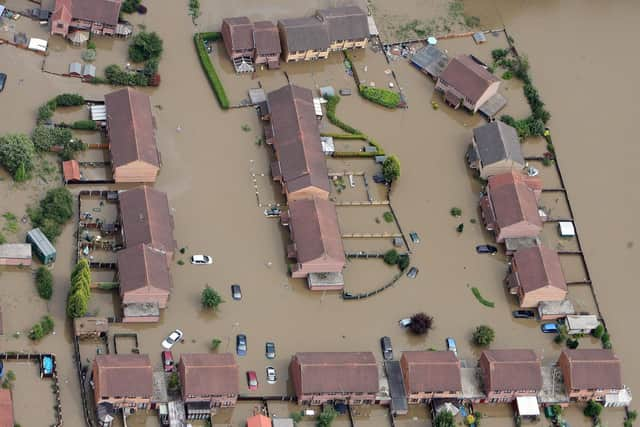How Hull protected itself from flooding damage following the damage of 2007 storms - Pip Betts
Communities across our region face a variety of different types of flood risk but climate change, together with increasing urbanisation, means that flood events are happening more frequently.
During the 2007 floods, more than 1300 business premises were damaged in Hull alone. The Environment Agency estimates that the average cost of damage suffered by businesses during a flood event is around £82,000. As many as 40 per cent of businesses never reopen after being flooded, and a further 25 per cent of businesses that do reopen go on to fail within a year.
Advertisement
Hide AdAdvertisement
Hide AdOf course, that’s before we even begin to factor in the heavy toll that flooding takes on your mental health and emotional wellbeing due to the stress, disruption and uncertainty it causes.


Thankfully, by taking a few simple steps to protect their premises, small to medium enterprises (SMEs) can give themselves a fighting chance of surviving future flooding events, not to mention peace of mind. In fact, every £1 spent on property flood resilience measures can save businesses around £5 in flood damage.
Property flood resilience is a term used to describe measures that reduce the risk of flood damage to properties, speed up the recovery process and enable people to get back into their properties quicker after flooding.
These measures are installed in business premises, as well as people’s homes, to make them less vulnerable to flooding. Property flood resilience solutions are bespoke to each property; the aim is to identify the measures that are most appropriate for your premises and the type of flooding you face.
Advertisement
Hide AdAdvertisement
Hide AdSince the devastating 2007 floods, which affected communities across the Hull and East Yorkshire area, the University of Hull has been working hard to develop leading research and knowledge in flood resilience.


Located at the university, the Energy and Environment Institute recognised the need for an innovation centre aimed at boosting the resilience of the people, property and businesses of the region. The team there developed the £3.4m Flood Innovation Centre project and were successful in securing £1.9m from the European Regional Development Fund (ERDF), which was matched with a £1.5m contribution from the university.
We’re delighted the Flood Innovation Centre has been able to expand the range of services it provides and can now offer fully-funded support to eligible SMEs in Hull, East Yorkshire and South Yorkshire that are keen to protect their business premises, employees and other assets against the risk of flooding.
As a team, we recognise that there’s a lack of awareness about what property flood resilience is and how it works. We also know that every business is unique and that’s where our new tailored approach to working with businesses individually comes in. Our technology research managers will work with an SME to create a bespoke, innovative solution based on their location, flood risk, employee profile, building design and other factors.
Advertisement
Hide AdAdvertisement
Hide AdOur funding means that this support is provided at no cost to eligible businesses. Both the Flood Innovation Centre team and the wider team at the University of Hull are committed to boosting the resilience of communities at a local, regional and national level. The climate crisis means that the need to take action to mitigate and adapt to flood events has never been so vital.
Businesses concerned about flooding and its potential impact on their activities are encouraged to get in touch with us at the Flood Innovation Centre by telephoning 01482 462275, emailing [email protected] or completing our online registration form at www.floodinnovation.co.uk/register
Pip Betts is the Project Manager at the Flood Innovation Centre, University of Hull